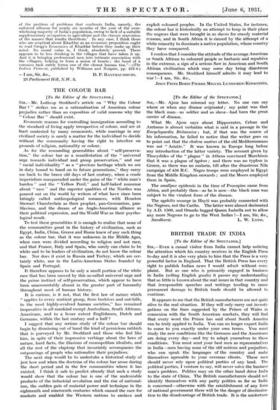[To the Editor of the SPECTATOR.] SIR,—Mr. Ajose has misread
my letter. No one can say where or when any disease originated ; my point was that the black man—as soldier and as slave—had been the great carrier of disease.
What Mr. Ajose says about Hippocrates, Celsus and Aretaeus is almost verbatim what is said in a passage in the Encyclopaedia Britannica ; but, if that was the source of his information, he failed to notice that the writer goes on to point out that the cholera nostras of the old Mediterraneans was not " Asiatic." It was known in Europe long before any introduction of the latter variety. The account given by Thucydides of the " plague " in Athens convinced Murchison that it was a plague of typhus ; and there was no typhus in Greece, as there was no malaria, till after the disastrous Nile campaign of 456 B.C. Negro troops were employed in Egypt from the Middle Kingdom onwards ; and the Moors employed them in Spain.
The smallpox epidemic in the time of Procopius came from Africa, and probably then—as he is now—the black man was subject to the virulent form of the disease.
The syphilis scourge in Hayti was probably connected with the Negroes, not the Caribs. The latter were almost decimated by A.D. 1500, and Orando begged Queen Isabella not to allow any more Negroes to go to the West Indies !—I am, Sir, &c.,






































 Previous page
Previous page